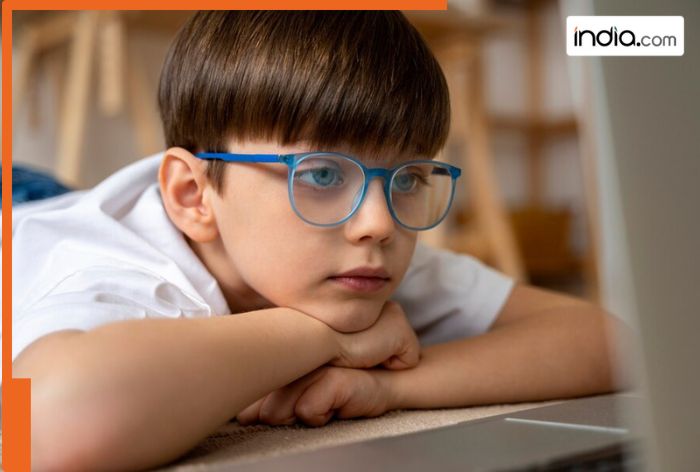Does blue light from screens cause myopia? 10 eye care tips you must know
Near sightedness is a common issues and increased screentime is a concern. Here are few tips to know for better eye care.

The issue of myopia (often in most cases is legendary as near sightedness) is commencing to be worrisome a results of growing trend on this condition among youngsters and children. The entire way through this digital age, where devices are integrated into our lives, there has been a virus of myopia internationally. Where wearing glasses was once a rare sight in the small youngsters and adults, spectacles have grow to be common-use and dot the faces on many in the present generation.
Eye Health Myths
Myth: The upward push in screen time has increased myopia among youngsters and adults.
Fact: In keeping with Dr Digvijay Singh, Director Noble Eye Care, Gurugram there may per chance be always the chance of strain developing in the eyes as a result of reading or having a look at slides for prolonged hours etc, but this does now no longer solely lead people to developing myopia. Instead, or not it is able to be genes and absence of physical activity outside which are the dominant factors. Essentially, there are also studies which prove the more hours spent outside reduces the probabilities of children developing myopia and or not it is able to be now no longer just as a result of their reduced screen time.
Myth: It is a protracted way the blue light from the screens that causes myopia and is harmful.
Fact: Kind of the opposite, blue light has no ill effects on the eyes or may per chance be a lead to of myopia as long as or not it is able to be from a screen. Alternatively, an excessive amount of use of screens does lead to issues with sleep comfort as or not it is able to be in a position to lead to now no longer enough rest and one’s body feeling drained. It is going to most probably be shunned by switching on a blue light filter of the device or ignoring the screens no longer not as much as as a minimum one hour sooner than sleep.
Myth: Reading on screens is worse than reading on paper.
Fact: It is a protracted way now no longer the medium either a screen or paper that exposes risk of myopia but the amount of time and distance an object is held close. Specializing in something close for a very long time equivalent to reading a book puts stress on the eyes. The 20-20-20 rule (having a look at a distance 20 feet for 20 seconds every 20 minutes) can lend a hand in cutting back stress on the eye to a level.
Myth: Reducing the time spent on screens will prevent the progression of myopia.
Fact: Reducing on screen time can lend a hand in eye pressure but does now circuitously halt the advancement of myopia. Appropriate treatments equivalent to orthokeratology lenses, atropine eye drops, or specialized glasses recommended by the eye care professionals limit myopic progression.
Myth: Young individuals are the one real ones that will get screen myopia.
Fact: Excessive screen use can lead to adults developing digital eye strain nonetheless it truly is now no longer almost like myopic conditions coming up or degenerating. Symptoms of eyeball strain like dry eyes or headaches are somewhere experienced and that they may perhaps well be treated through rest and suitable postures.
10 Eye Care Tips
- Keep away from prolonged screen time: Screen needs for use in brief intervals. Ideally every 20 minutes one should take a break and do something about a a lot off object for 20 seconds, says Dr Singh.
- Use an even bigger screen: Wherever conceivable, a larger screen at a distance has to be hottest to a smaller screen at near. Use a television to watch your movies rather then a laptop. Prefer a desktop or laptop for online classes or video conferences rather then a tablet or smartphone.
- Correct Lighting fixtures: Watch screens in a well-lit room with indirect lighting onto the screen to steer clear of glare. screens or reading in a dimly lit room causes immense eye strain. Do now no longer have a mild just at the back of the screen or at the back of you casting your shadow on the screen.
- Screen brightness: Keep screen brightness setting to moderate. Very low or very high brightness both trigger off strain and may per chance lead to eye fatigue.
- Use Glasses: Prescription spectacles (powered) has to be worn the total time. An anti-glare coating may per chance be helpful in cutting back eye strain. There is never any longer any proven benefit of blue blockading or tinted glasses as of at this time time. Glasses has to be cleaned on a regular basis and there has to be no scratches on the lens.
- Frequent blinking: Our blink rate reduces from 14-sixteen times a minute to Four-6 times a minute after we are on the screen. You probably can are having a look to blink regularly to steer clear of eye fatigue and dryness. Use of lubricant eyedrops may per chance be done if eyes seem dry or tired.
- Spend Time Outdoors: Spending time outdoors is proven to be reasonably reasonably a number the strongest protectors against myopia and worsening eyesight. It is a protracted way recommended to spend no longer not as much as 2 hours outside in natural light on every day basis.
- Decrease near activities: Young people and young adults should limit the time they spend on doing near activities including reading, digital devices and fine art work. Constant specializing in near work for more than forty 5 minutes is probably going to amplify the chance of developing progressive myopia.
- Take a brilliant diet: A diet rich in green leafy vegetables, carrots, beetroot, citrus fruits, almonds, avocados, eggs and fish can lend a hand support healthy cornea and retina function that will boost good eyesight.
- Do eye exercises: Straight forward eye exercises equivalent to pencil pushups, distance focusing exercises and relaxation exercises go a protracted way in toning the muscles and overcoming a developing eye weakness.
What's Your Reaction?




















































